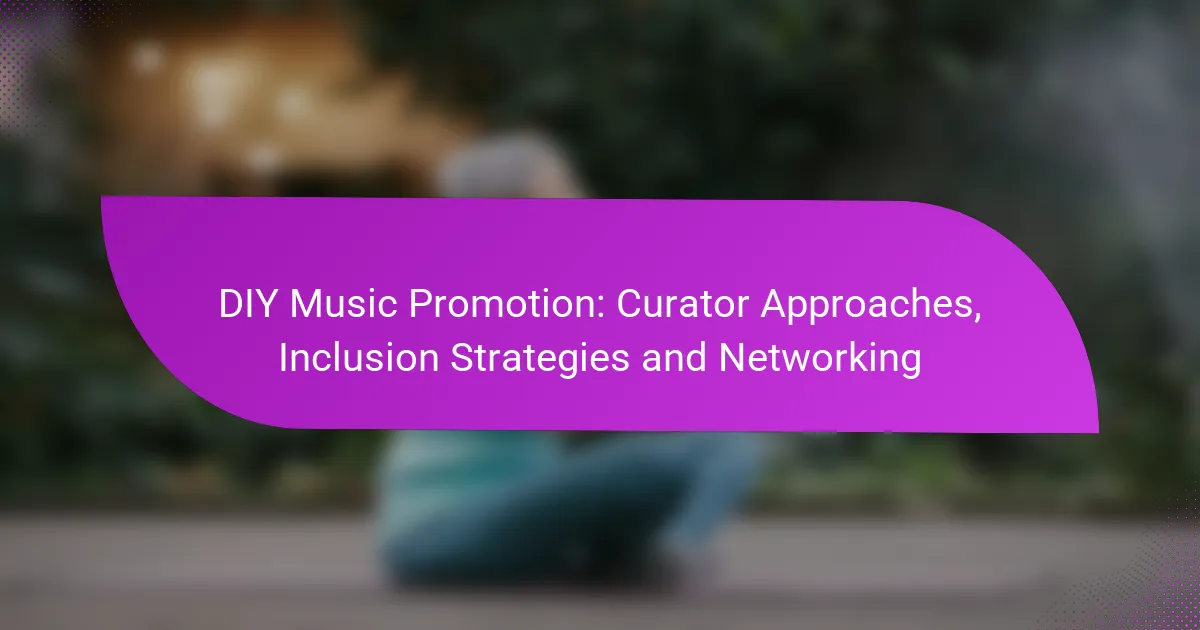DIY music promotion in the US requires a strategic approach that harnesses social media, local engagement, and collaborations with music curators. By targeting the right curators and actively including diverse communities, artists can enhance their visibility and connect with a wider audience. These methods not only promote individual music but also enrich the cultural landscape as a whole.
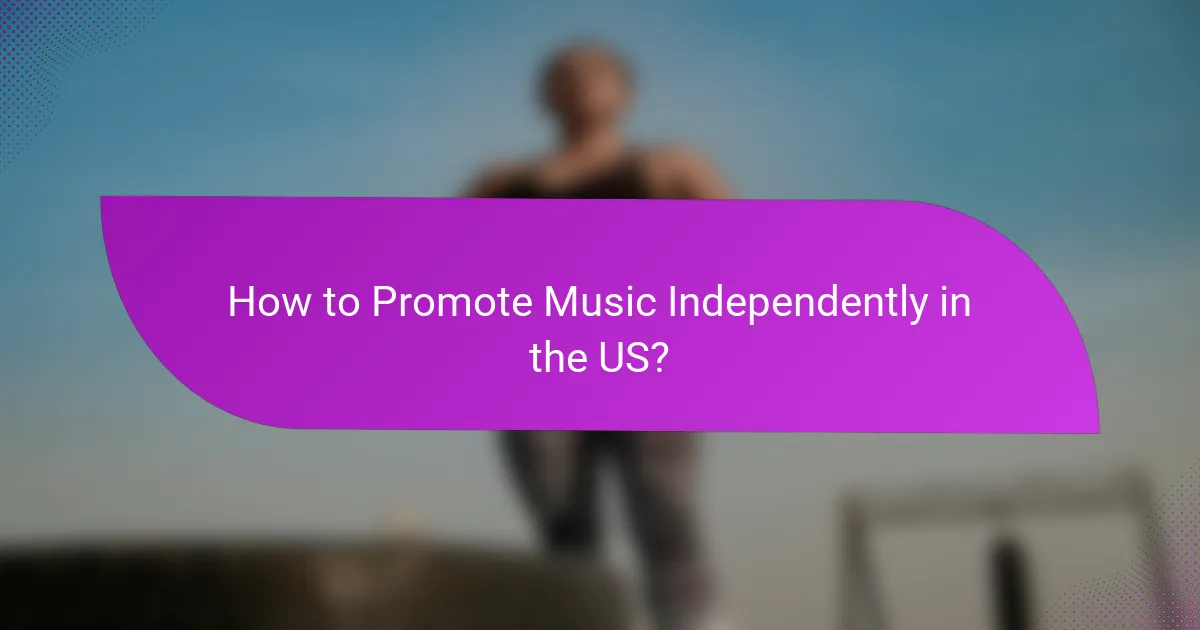
How to Promote Music Independently in the US?
Promoting music independently in the US involves leveraging various platforms and strategies to reach your audience effectively. Key methods include utilizing social media, engaging with local communities, and collaborating with music blogs and curators.
Utilize Social Media Platforms
Social media is a powerful tool for independent music promotion. Platforms like Instagram, Facebook, and TikTok allow artists to share their music, connect with fans, and build a brand presence. Regularly posting engaging content, such as behind-the-scenes footage or live performances, can significantly increase visibility.
Consider using targeted ads to reach specific demographics. Spending even a modest budget can yield substantial returns by attracting new listeners. Aim to post consistently and interact with followers to foster a loyal fanbase.
Leverage Music Blogs and Curators
Getting featured on music blogs and playlists curated by influencers can greatly enhance your reach. Research blogs that align with your genre and submit your music for consideration. Personalizing your pitch can increase your chances of getting noticed.
Additionally, platforms like SubmitHub allow you to connect with curators easily. Focus on building relationships with these influencers, as they can provide ongoing support and exposure for your music.
Engage with Local Music Communities
Connecting with local music communities can provide valuable networking opportunities and support. Attend open mics, local shows, and music festivals to meet other artists and fans. Building a local following can create a strong foundation for your music career.
Consider collaborating with local musicians or participating in community events. This not only enhances your visibility but also fosters a sense of belonging within the music scene.
Implement Email Marketing Campaigns
Email marketing remains an effective way to promote your music directly to fans. Build an email list by offering exclusive content, such as free downloads or early access to tickets. Regular newsletters can keep your audience informed about new releases and upcoming shows.
Use engaging subject lines and clear calls to action to encourage opens and clicks. Aim for a balance between promotional content and personal updates to maintain interest and engagement.
Host Live Events and Gigs
Hosting live events is a direct way to connect with your audience and promote your music. Consider booking gigs at local venues or organizing house concerts. Live performances not only showcase your talent but also create memorable experiences for fans.
Promote your events through social media and email marketing. Collaborate with other artists to expand your audience and share costs. Ensure to follow local regulations regarding permits and safety to create a successful event.
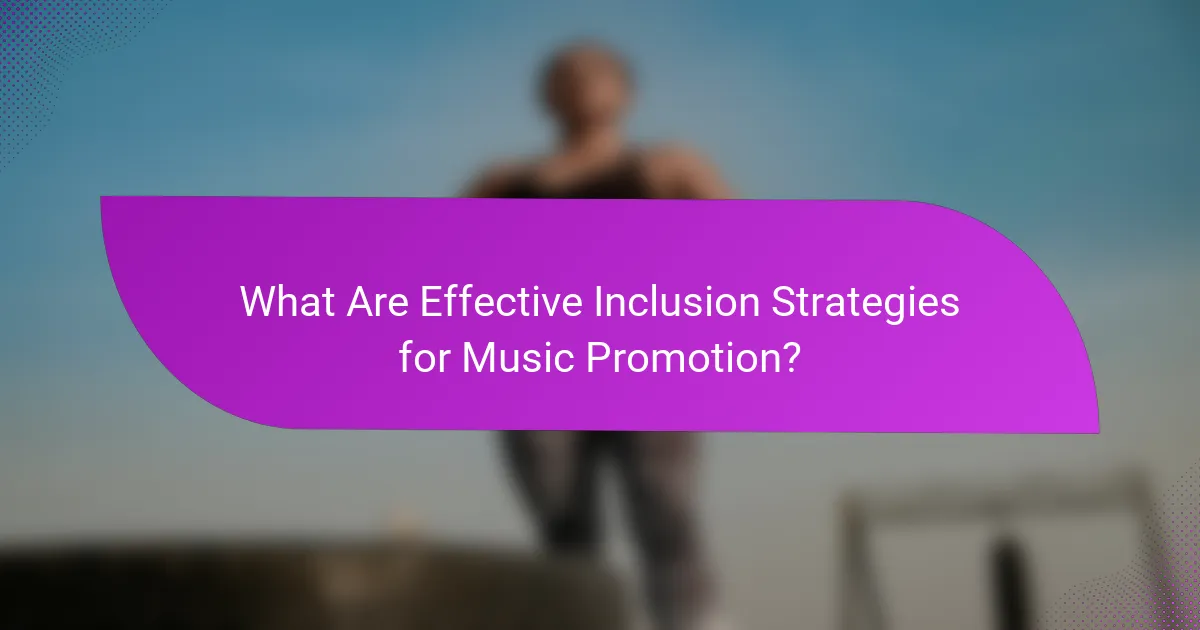
What Are Effective Inclusion Strategies for Music Promotion?
Effective inclusion strategies for music promotion involve actively engaging diverse communities and fostering collaboration among artists. These approaches not only enhance visibility but also create a richer cultural landscape that resonates with a broader audience.
Collaborate with Other Artists
Collaborating with other artists can amplify your reach and introduce your music to new audiences. Consider partnering with musicians from different genres or backgrounds to create unique projects that blend styles and attract varied listener demographics.
When collaborating, ensure that the partnership is mutually beneficial. Share promotional responsibilities and cross-promote on social media platforms to maximize exposure. This can lead to increased streams, followers, and engagement for all involved.
Engage Diverse Audiences
Engaging diverse audiences requires understanding and respecting different cultural backgrounds. Tailor your marketing efforts to reflect the interests and values of various communities, which can include hosting events in diverse neighborhoods or participating in multicultural festivals.
Utilize social media to connect with different groups by sharing content that resonates with them. Consider creating playlists that feature a mix of genres or artists from various backgrounds, which can help attract a wider audience and foster inclusivity.
Utilize Inclusive Language in Marketing
Using inclusive language in your marketing materials is essential for reaching a broad audience. Avoid jargon or terms that may alienate certain groups and instead opt for language that is welcoming and relatable to all potential listeners.
Be mindful of the imagery and messaging in your promotional content. Highlight diversity in your visuals and narratives, ensuring that everyone feels represented. This can enhance your brand’s appeal and foster a sense of community among your listeners.
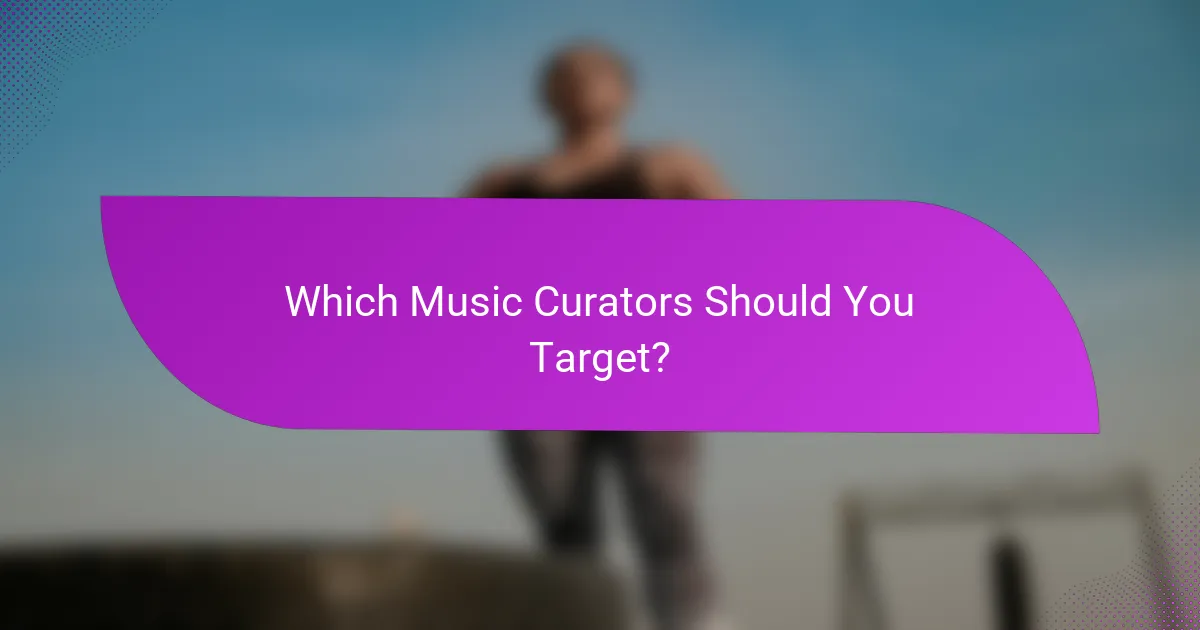
Which Music Curators Should You Target?
Targeting the right music curators is essential for effective DIY music promotion. Focus on those who align with your genre and audience to maximize your chances of gaining exposure.
Identify Genre-Specific Curators
Start by identifying curators who specialize in your music genre. This can include bloggers, playlist creators, and social media influencers who have a dedicated following in that niche.
Utilize platforms like Instagram, TikTok, and YouTube to find curators who regularly feature similar artists. Make a list of these individuals and their contact information for outreach.
Research Influential Playlists on Spotify
Spotify playlists can significantly boost your visibility, so research influential playlists that cater to your genre. Look for playlists with a substantial number of followers and regular updates.
Tools like Chartmetric and PlaylistPush can help you discover playlists and their curators. When reaching out, personalize your message to highlight why your music fits their playlist theme.
Connect with Local Radio Stations
Local radio stations are valuable for promoting your music within your community. Research stations that feature independent artists and reach out to their programming directors.
Prepare a press kit that includes your music, a bio, and any relevant press coverage. Offer to perform live or participate in interviews to increase your chances of getting airtime.
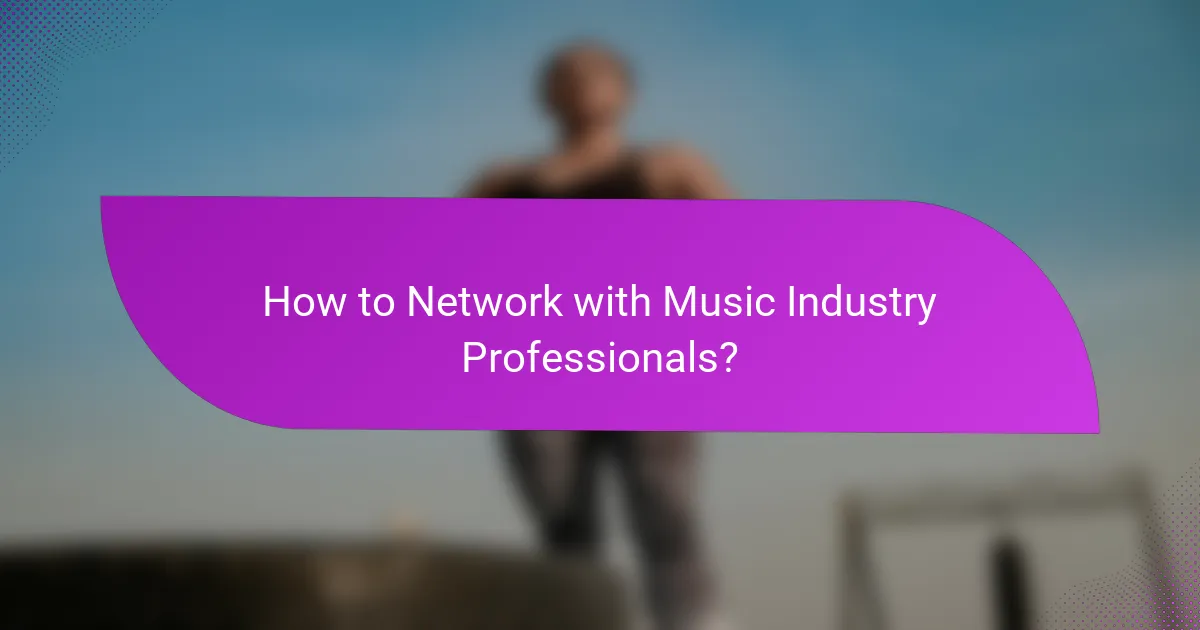
How to Network with Music Industry Professionals?
Networking with music industry professionals involves building relationships that can enhance your career opportunities and visibility. Effective networking requires strategic engagement, both in-person and online, to connect with key individuals in the industry.
Attend Music Conferences and Festivals
Music conferences and festivals are prime opportunities to meet industry professionals face-to-face. Events like South by Southwest (SXSW) or the Winter Music Conference attract artists, producers, and label representatives, providing a platform for networking.
When attending, prepare by researching attendees and creating a list of individuals you want to meet. Bring business cards and be ready to discuss your work succinctly. Follow up with new contacts after the event to solidify connections.
Join Online Music Communities
Online music communities, such as forums and social media groups, offer a space to connect with industry peers. Platforms like Reddit, Facebook groups, and specialized music forums allow for discussions, sharing resources, and seeking advice.
Engage actively by contributing to discussions and offering insights. This not only builds your reputation but also helps you discover potential collaborators and mentors. Remember to be respectful and supportive to foster a positive environment.
Utilize LinkedIn for Professional Connections
LinkedIn is a powerful tool for networking with music industry professionals. Create a polished profile that highlights your skills, experience, and projects to attract attention from industry insiders.
Use LinkedIn to connect with professionals you meet at events or through online communities. Personalize your connection requests with a brief message about your shared interests or experiences. Regularly share relevant content to stay visible in your network.
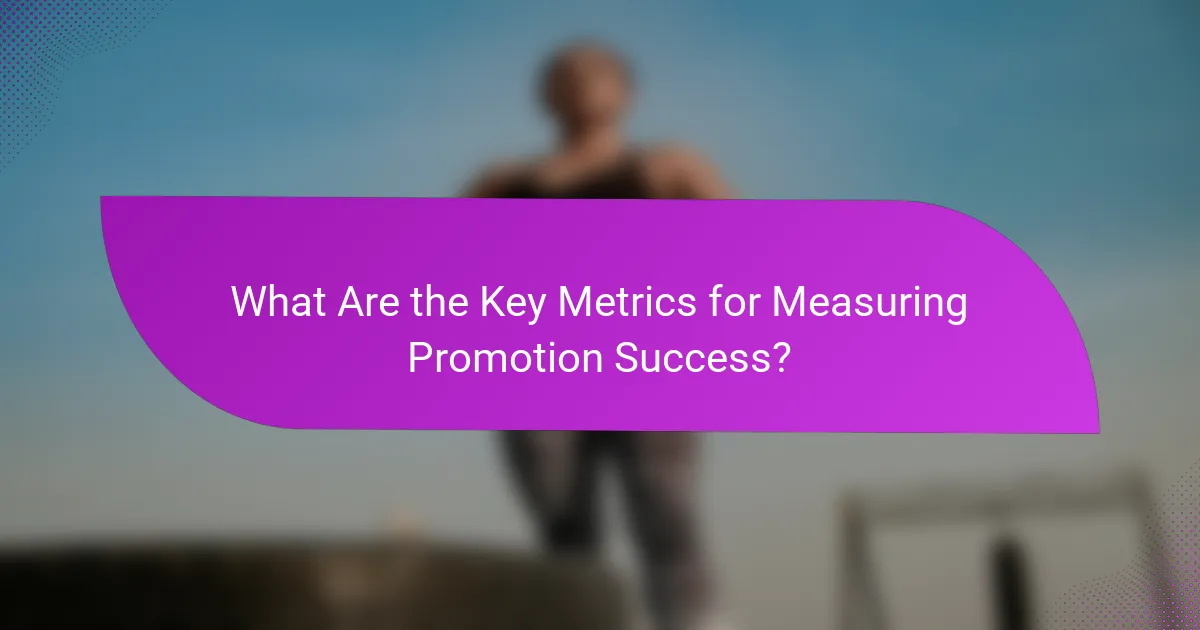
What Are the Key Metrics for Measuring Promotion Success?
Key metrics for measuring promotion success include streaming numbers and social media engagement. These metrics provide insights into how well your music is resonating with audiences and can guide future promotional strategies.
Track Streaming Numbers
Tracking streaming numbers is crucial for assessing the reach of your music. Platforms like Spotify and Apple Music provide analytics that show how many times your tracks have been played, which can indicate popularity and listener retention.
Consider monitoring trends over time, such as weekly or monthly streaming counts. A sudden spike might suggest a successful promotional effort, while a decline could signal the need for a new strategy. Aim for consistent growth in streams, ideally in the low thousands to tens of thousands range for emerging artists.
Analyze Social Media Engagement
Social media engagement is another vital metric for gauging promotion success. This includes likes, shares, comments, and overall follower growth across platforms like Instagram, Facebook, and TikTok.
Engagement rates can reveal how well your audience connects with your content. A good benchmark is an engagement rate of around 1-3% for posts. Focus on creating interactive content, such as polls or Q&A sessions, to boost engagement and foster community.
